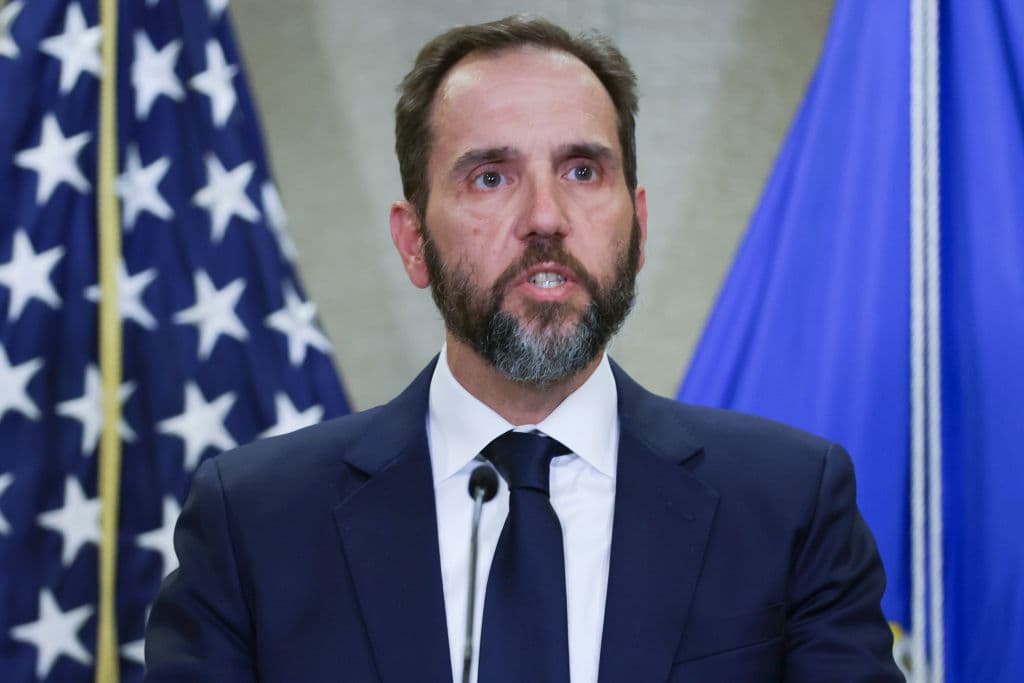Jack Smith, After Underestimating Presidential Immunity, Slims Down Indictment of Trump, but the Case Is Far From Over
The special counsel’s revised indictment departs from the original to adjust for the Supreme Court’s rulings earlier this year.

The filing by Special Counsel Jack Smith of a new indictment in the January 6 case retools the effort to convict President Trump for working to overturn the results of the 2020 election. It amounts to a victory of sorts for the 45th president, whose liability is lessened — but not eliminated — after the special prosecutor failed to grasp the immunity the Constitution affords a president for official acts.
The new charge sheet — it runs to 36 pages as opposed to the original’s 45 — comes after the Supreme Court, in Trump v. United States, ruled that presidential official acts are presumptively immune, while unofficial ones are bereft of protection. Some acts in the heartland of presidential prerogative are absolutely immune.
The justices returned the case to Judge Tanya Chutkan for hearings to determine which acts in Mr. Smith’s original indictment were fair game for prosecutors, and which could feature neither in charges nor in evidence. The special counsel requested more time to present Judge Chutkan with the government’s view for how the case ought to proceed. Now, he presents a new indictment.
Mr. Smith’s fresh version of the case retains all four of the original charges against Trump. His office declares that “The superseding indictment, which was presented to a new grand jury that had not previously heard evidence in this case, reflects the Government’s efforts to respect and implement the Supreme Court’s holdings and remand instructions in Trump v. United States.” Grand juries overwhelmingly hand up charges when summoned to do so.
The special counsel’s refined indictment departs from the original in several ways that reflect Mr. Smith’s digestion of the high court’s ruling. Removed are references to Trump’s interactions with the Department of Justice. The Nine found that those allegations “plainly implicate Trump’s ‘conclusive and preclusive’ authority” and were therefore absolutely immune. The majority found that Trump is protected “from prosecution for the alleged conduct involving his discussions with Justice Department officials.”
Mr. Smith also excised any reference to to one of the six unindicted co-conspirators mentioned in the original indictment, “a Justice Department official who worked on civil matters and who, with the defendant, attempted to use the Justice Department to open sham election crime investigations and influence state legislatures with knowingly false claims of election fraud.” That is understood to be Jeffrey Clark, who was criminally charged by Fulton County District Attorney Fani Willis.
The Supreme Court also held that Mr. Smith’s accusation that Trump “attempted to pressure the Vice President to take particular acts in connection with his role at the certification proceeding thus involve official conduct, and Trump is at least presumptively immune from prosecution for such conduct.” The special counsel therefore bears the burden of proof — a heavy one — to show that those acts are vulnerable to prosecution.
Mr. Smith’s new indictment demurs from excising Trump’s colloquies with Vice President Pence, suggesting that such interactions could be a central point of contention at trial, and possibly on appeal. The special counsel, though, does insist that Trump’s rally at the Ellipse on January 6 was a “Campaign speech” and a “privately-funded, privately-organized political rally.” That language is designed to paint that crucial event as unofficial.
The Supreme Court appears to give the government the widest latitude when it comes to the allegations that Trump pressured state officials to reverse electoral results. The justices group these accusations as ones that involve “Trump’s interactions with persons outside the Executive Branch: state officials, private parties, and the general public.” Mr. Smith focuses on the pressure the 45th president brought to bear in Arizona, Georgia, Michigan, and Pennsylvania. Trump will argue those acts are protected.
The case’s new shape can be seen in the revised indictment’s assertion that Mr. Smith describes Trump’s alleged co-conspirators — largely private lawyers the former president turned to for advice — were not “government officials during the conspiracies and all of whom were acting in a private capacity.” The timing of the filing of the new indictment is likely intentional, as well. DOJ regulations avoid filing charges against candidates 60 days before an election. That deadline is about 10 days away for November’s vote.

